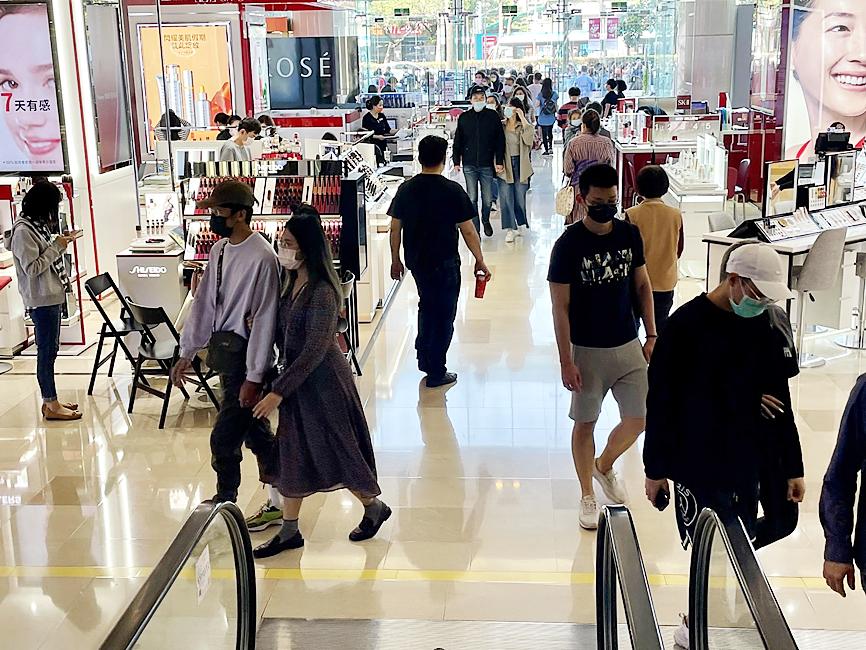The consumer confidence index this month gained 1.88 points to 76.52, its highest since March last year, as the economic situation improved at home and abroad, fueling inflation risks and concern over potential capital flight from equity markets, a National Central University survey released yesterday showed.
Spikes in raw material prices would eventually drive up inflation readings and prompt central banks worldwide to step in and tighten interest rates, said Dachrahn Wu (吳大任), director of the university’s Research Center for Taiwan Economic Development, which conducted the survey.
Changes in monetary policy, especially by the US Federal Reserve, would trigger capital flight from global bourses, Wu said, calling on investors to be cautious.

Photo: Tang Tsai-hsin, Taipei Times
Of the consumer confidence index’s sub-indices, the gauge on stock investment rose the most. It increased 5.4 points to 52.5, despite share price corrections among major tech firms, Wu said.
“Inflation risks pose a substantial challenge for policymakers worldwide this year,” Wu said, adding that the US producer price index rose significantly, heaping inflation pressure on consumer prices, which might hit the 2 percent alert level in the first half of this year.
The Fed would have no choice but to raise interest rates to keep inflation at bay, Wu said, adding that inflation risks could haunt Taiwan, as evidenced by escalating oil and iron ore prices.
Bank deposits would become attractive following interest rate hikes, he added.
The 10-year Treasury yield has already jumped above 1.6 percent, better than the dividend payouts most technology firms can offer, analysts have said.
The sub-index on the job market rose 4.2 points to 70.55, while the measure on economic outlook gained 1.55 points to 89.5, the monthly survey showed.
People also became more confident about household income moving forward, tipping the sub-index 1.3 points higher to 91.95, it said.
The sub-index on purchases of durable goods dropped 1.05 points to 111.6, as interest in real-estate properties remains healthy, the survey said.
Confidence scores of higher than 100 suggest optimism and values lower than the threshold indicate pessimism.
The reading on inflation expectations was 43, a fractional 0.15 point lower than one month earlier, meaning that the public is not concerned about price hikes, the survey said.
The survey polled 2,832 adults by telephone from March 18 to 21. It has a margin of error of 2 percentage points.

Intel Corp chief executive officer Lip-Bu Tan (陳立武) is expected to meet with Taiwanese suppliers next month in conjunction with the opening of the Computex Taipei trade show, supply chain sources said on Monday. The visit, the first for Tan to Taiwan since assuming his new post last month, would be aimed at enhancing Intel’s ties with suppliers in Taiwan as he attempts to help turn around the struggling US chipmaker, the sources said. Tan is to hold a banquet to celebrate Intel’s 40-year presence in Taiwan before Computex opens on May 20 and invite dozens of Taiwanese suppliers to exchange views

Application-specific integrated circuit designer Faraday Technology Corp (智原) yesterday said that although revenue this quarter would decline 30 percent from last quarter, it retained its full-year forecast of revenue growth of 100 percent. The company attributed the quarterly drop to a slowdown in customers’ production of chips using Faraday’s advanced packaging technology. The company is still confident about its revenue growth this year, given its strong “design-win” — or the projects it won to help customers design their chips, Faraday president Steve Wang (王國雍) told an online earnings conference. “The design-win this year is better than we expected. We believe we will win

Chizuko Kimura has become the first female sushi chef in the world to win a Michelin star, fulfilling a promise she made to her dying husband to continue his legacy. The 54-year-old Japanese chef regained the Michelin star her late husband, Shunei Kimura, won three years ago for their Sushi Shunei restaurant in Paris. For Shunei Kimura, the star was a dream come true. However, the joy was short-lived. He died from cancer just three months later in June 2022. He was 65. The following year, the restaurant in the heart of Montmartre lost its star rating. Chizuko Kimura insisted that the new star is still down

While China’s leaders use their economic and political might to fight US President Donald Trump’s trade war “to the end,” its army of social media soldiers are embarking on a more humorous campaign online. Trump’s tariff blitz has seen Washington and Beijing impose eye-watering duties on imports from the other, fanning a standoff between the economic superpowers that has sparked global recession fears and sent markets into a tailspin. Trump says his policy is a response to years of being “ripped off” by other countries and aims to bring manufacturing to the US, forcing companies to employ US workers. However, China’s online warriors